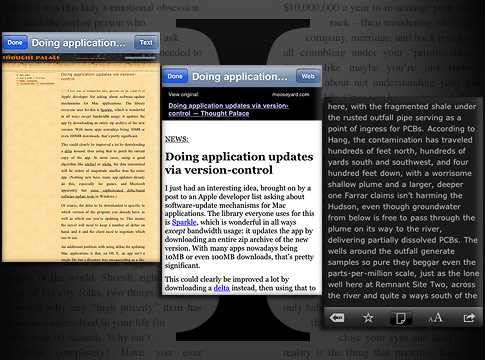Instapaper撤下免费版 外媒评述未来手机应用发展趋势
你可曾注意到,Instapaper应用(游戏邦注:该应用获取并存储在线文章,供用户在手机上离线阅读。)免费版大约1个月前从应用商店中消失了?Read Write Web编辑也没有注意到这个现象,但26日Instapaper创建者Marco Arment表示他将这个应用当成自己的试验品。结果似乎并没有像众人料想的那样,自取消免费程序后事情进展顺利。
也就是说,用户不是非需要程序免费不可,这可能与普遍观点相违背。正如Arment所提到的,如果开发者做出足够好的产品,人们愿意为之付费。Arment说道:“作为实验,1个月前我暂时从App Store中撤除免费版应用。付费应用的销售量仍然很不错,几乎没有人抱怨这个举动。”随后他表示,自己也不确定何时会把免费版本放回商店中。他认为这关乎的不仅是金钱问题,而是有益于产品推广。Arment指出随后将在博客中详尽阐述相关事宜。
Arment是开发者中的亡命之徒,公然对抗应用需要免费的普遍观点,抑或是巨大变革的参与者呢?
近期,刺激安装(游戏邦注:用户通过下载其他应用获得在游戏内使用的货币,开发商利用此方法提升应用在App Store中的排名。)成为苹果采取严厉措施制裁的对象。Arment的观点似乎在说明,用户自然会注意到某款值得付费的应用,无需通过游戏或刺激安装的手法。也就是说,用产品质量刺激用户下载安装。
有些观察者辩解称,免费应用成为整个生态系统的大累赘,使得付费应用开发者花过量的费用来补贴他们免费的对手。Renne Ritchie将开发者Manton Reece的评论总结如下:“我们已在App Store中发现了大量问题,从苹果收取付费应用30%的盈利到应用内购买再到iAd,甚至现在连订阅的源头都可以追溯到苹果保持应用免费的决定。换句话说,支持、营销和提供免费应用所产生的费用已使苹果不堪重负,需要从付费应用和内容中榨取足够的金钱来弥补。”
今年早期,欧洲重要手机应用开发者、打折电话拨打应用0870的制作者Simon Maddox于2月份声称自己能够接受“取消免费应用”的政策。
尽管Arment和Maddox的应用在iOS平台上进展迅速,但过去6个月中该平台免费应用的增长量确实比付费应用多。Android的表现刚好与之相反,Google手机平台付费应用的增长速度超过免费应用。Android可能是自由放任经济的典范,应用只能凭借功能和质量在该平台上杀出重围,最终用户付费使用这些应用。Android近期的表现是免费应用退出市场的开端吗?
Arment即将写就的博客肯定会很有趣。API作者Kin Lane对此评述道:“我最欣赏Arment和Instapaper之处在于前者在自己的应用和API上尝试不同的盈利战略,并将他的想法和过程与全世界共享。”Instapaper现在可用于iTune上,售价为4.99美元。其竞争者Read It Later有免费版本和售价2.99美元的版本。(本文为游戏邦/gamerboo.com编译,转载请注明来源:游戏邦)
Instapaper Founder: Apps Don’t Need To Be Free
Have you noticed that the free version of Instapaper, the app that captures online articles and stores them for offline reading on your mobile device, disappeared from the app store about a month ago? Neither had we, but today, Instapaper founder Marco Arment tweeted that he pulled the app “as an experiment” and, rather than what you might expect, things have run smoothly since then.
Perhaps, contrary to what might be popular opinion, you don’t need a free app after all. Instead, as Arment alludes, if you make a good enough product people will be willing to pay for it. “As an experiment, I temporarily pulled the Free app from the App Store over a month ago,” tweeted Arment. “Sales of the paid app remain great. Few complaints.” He’s not sure, he then said, “when, or even if” he’ll put the free one back in the store. “It’s not just about the money: it’s about the product,” he said, noting that he would “blog about it at length soon.”
Is Arment an outlaw among developers, standing up against a commonly held belief that apps need to be free, or is he a part of a greater revolution?
Apple recently began cracking down on incentivized installs, wherein users are plied with in-game credits to download other apps and artificially inflate their rankings in the App Store. Arment’s comments seem to say that users notice when an app is worth paying for and be damned any gaming or incentivizing. Incentivize with a quality product.
Some observers now argue that free apps are a big drag on the whole ecosystem and are costing paid app developers undue sums to subsidize their free counterparts. Renne Ritchie summarizes an argument by developer Manton Reece, saying that “a lot of the problems we’ve seen in the App Store, from the across the board 30% revenue cut Apple requires for paid apps, to in-app purchases, to iAds, and now subscriptions can all be traced back to Apple’s decision to host free apps for free. In other words, that the cost of approving, hosting, marketing, and delivering free apps is high enough that Apple is struggling and stumbling to make enough off paid apps and content to cover it.”
Earlier this year, Simon Maddox, one of Europe’s leading mobile developers and creator of a discount phone calling app called 0870, announced in February that he was adopting a “no more free apps” policy.
While Arment and Maddox are rowing upstream on the iOS platform, where the proportion of free apps to paid apps has actually grown over the past six months, the opposite is happening on Android. Google’s mobile platform is seeing a growth of paid apps over free ones. Perhaps Android is an example of a laissez faire economy and the way apps will stand out on Android is through functionality and quality alone and, in the end, users will pay for them. Could this be the beginning of the end for free apps?
Arment’s forthcoming blog post on the move is sure to be interesting. “What I like most about Arment and Instapaper is he experiments with different monetization strategies for his app and API,” writes API evangelist Kin Lane about the move, “and shares his thoughts and reasoning with the rest of the world.” Instapaper is now available on iTunes for $4.99. Competitor Read It Later is available in both free and $2.99 versions. (Source: Read Write Web)










































